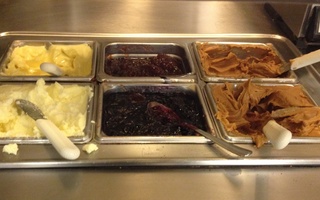I
Introduction
Since board costs are such an important part of every student's expenses in college, and since the quality of the food he eats affects his health and ability to work, the Student Council last fall appointed a committee to investigate complaints from students about both the quality and cost of meals in the House Dining Halls. As far as the Committee knows, this is the first time any such investigation has been undertaken.
From 20 to 30% of an average student's annual expenses is for board, and a growing feeling that he was not getting his money's worth culminated this year in a petition, signed by 137 students, asking the Council to look into this matter. The petition expressing student dissatisfaction specifically asked that the Council determine (1) whether the present board rate is a reasonable charge for food and service given, and (2) if the existing rate is reasonable, whether changes might be made in the nature of the food and the service which would make a rate reduction possible.
Since its appointment in October, a nine-man committee, consisting of four members of the Council and five students not on the Council, has been investigating the problems connected with board rates. The Committee treated chiefly the four points which seemed most to affect the quality and price of the food. These were as follows: (1) the wholesale costs of food purchased; (2) the quality of the foods served; (3) the possible effects of reducing the number of extra dishes and second helpings now available; and (4) efficiency in the kitchens.
Although the committee considered dining hall service in its investigation, it will not treat this aspect of the problem at this time, since it believes that it is a different matter and one tied up with the whole question of student employment. Before any findings can be reported further investigation must be made and a poll of student sentiment held on the issue of student waiters. The problems of student employment and of the dining halls are closely, related because the funds for the Temporary Student Employment service come from the "profit" made by the halls. The Committee will report on this aspect of the investigation in the near future.
II
Findings
The Committee finds, in the first place, that the University purchases good quality foods at low prices. The fact that they are often not appetizing when served is caused mainly by poor preparation. The saving which might result from putting into effect the third point, namely cutting down extras and seconds, would not be large enough to justify this action. Finally, inefficiency in the kitchens is responsible for waste and poor food.
III
Raw Food Costs
In order to discover whether the University buys cheaply and well, the Committee attempted to check on the reputation as a buyer of Roy L. Westcott, who is Purchasing Agent for the University Dining Halls. Both Forrest L. Moore, now head butcher at the City Club in Boston and formerly butcher in the Harvard Union, and Joseph Stefani, Business Representative of the Cooks and Pastry Cooks Union, Local 106, in which many Harvard kitchen workers are enrolled, stated positively that Mr. Westcott is known as a shrewd buyer. To check more specifically on the lowness of the prices paid by Mr. Westcott, the Committee contacted Mr. Rose, an executive of the New England Dressed Meat and Wool Company Plant. On examining a list of prices which Harvard paid for meat on a given day, Mr. Rose pointed out that for the most part these prices ran one or two cents below the market wholesale price for that day. Although he did not know Mr. Westcott or his reputation as a buyer, Mr. Rose said that there was a great deal of competition for Harvard's business and that consequently the college necessarily obtained very good prices. His estimate was that Harvard gets the best quality meat at very low prices from jobbers with excellent reputations. To check on prices from another angle, the Committee compared a list of prices paid by Harvard for meat, butter, and fish on a certain day with the sale prices quoted by a number of large wholesalers and jobbers in Boston. Again it was found that the University buys at a considerable saving over the open market price.
In regard to the quality of the food purchased, it must be pointed out that the elaborate and diverse grading system used in the wholesale food trade makes both price comparison and quality estimate a difficult talk. Harvard does not buy the finest or "luxury" grade of foods. But the food purchased for the dining halls is good.
A conclusive check on Harvard's food purchasing efficiency could have been made only if it had been possible to discover what other large institutions in the Boston area have to pay for raw food. All that the Committee could find was that Harvard buys at a considerable saving over the price quoted in the market. It is not impossible that other large institutions, with a purchasing power comparable in magnitude to Harvard's, may purchase food at an even greater saving over the market price. Admitting that its findings are far from being absolutely conclusive, the Committee nevertheless believes that Harvard buys good quality food at low prices.
IV
Read more in News
Various Exhibits Now on Display in Widener LibraryRecommended Articles
-
Cliffies Will Not Scrape PlatesRadcliffe girls may end up scraping dishes someday, but they won't do it before they have to. Cliffies' lack of
-
Dining Halls Combat Silverware, Dish TheftDirty dishes are piling up across campus—but they’re not in the dining halls. Harvard University Dining Services (HUDS) has posted
-
 A Roller-Coaster Year for Dining Halls
A Roller-Coaster Year for Dining Halls -
IMPROVEMENTS PROMISED FOR LOWELL'S MENUPromising an investigation designed to improve the quality of the cooking in the Lowell House dining hall, Roy L. Westcott,
-
 Flyby Investigates: The Disappearance of Honey Butter
Flyby Investigates: The Disappearance of Honey Butter













